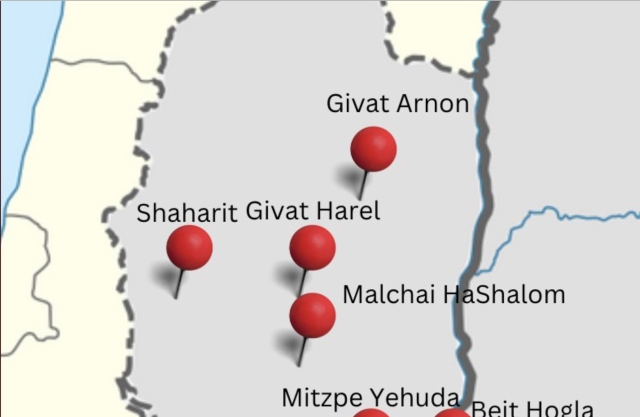Late Sunday night, the Israeli security cabinet approved the legalization of nine communities in Judea and Samaria. Some of those communities have been in existence for about 25 years with dozens of families living in them, including second-generation offspring who have grown up in the communities. Despite having been established decades ago, these communities still have no regular connections to electricity or water, bus lines, or post offices. The legalization will help change that.
The struggle for the legalization of these villages has been going on for many years. Two years ago, in what seemed like a significant window of opportunity for the settlement of Judea and Samaria, community leaders held a protest that included a makeshift camp and a hunger strike in front of the Prime Minister's office. In January 2021, Prime Minister Benjamin Netanyahu expressed hope for the settlement status, but in the end, the matter did not proceed, due in part to the opposition of the then Minister of Defense, Benny Gantz.
#BREAKING: The Israeli security cabinet decided
— Amichai Stein (@AmichaiStein1) February 12, 2023
1. legalize 9 outposts in the West Bank
2. building of thousands of new housing units in the settlements
3. connect outposts to water and electricity
Throughout Sunday night the communities of Judea and Samaria celebrated. After the end of the long cabinet meeting that took place, an announcement came from the Prime Minister's office stating that "in response to the murderous terrorist attacks in Jerusalem" the members of the cabinet unanimously decided on updating the status of 9 Israeli communities. "After consultation by the Prime Minister, the Minister of Defense, the Minister of Finance, the Minister of National Security, and the Minister of Strategic Affairs" it was agreed upon to legalize and qualify the following settlements: Abigail, Beit Hogla, Givat Harel/Harah (to be approved under one municipality), Givat Arnon, Mitzpe Yehuda, Melachai Hashalom, Asael, Sde Beaz and the agricultural farm called Shacharit.
Also, it was decided in the cabinet meeting that the Supreme Planning Council in the Civil Administration, which has not convened for about a year, will convene in the coming days in order to approve the construction of thousands of new housing units in existing Jewish areas of Judea and Samaria. It should be noted that the only time the council was convened during President Biden's term in the White House was under former Prime Minister Naftali Bennett. However, Bennett, who was formerly the CEO of the Judea and Samaria Council, agreed not to carry out a series of moves, as part of his power-sharing agreement with Yair Lapid.
🇵🇸🇮🇱 : The Israeli government has approved the "legalization" of 9 colonies located in the West Bank in response to recent attacks by Palestinians. They have also announced that they will build new buildings in the existing settlements.1/2 pic.twitter.com/ovPOwD0cah
— OSINT Expert (@BeAawaree) February 13, 2023
It was also announced at the end of the cabinet meeting on Sunday that it was decided to "reinforce police and security forces in Jerusalem and increased operational activity of the police against instigators and supporters of terrorism. Prime Minister Netanyahu emphasized that the security forces will act in a “targeted manner against the perpetrators of terrorism and there will be no collective punishment."


